The Real Relationship Between Capitalism and the Environment

Capitalism is incompatible with the conservation of nature. Only the places with a strong state and restricted economic freedom can achieve high environmental quality ratings. These statements have been repeated so often that most people consider them true without giving them a slightest thought.
Although these theories usually only explain one side of the coin, there are at least two groups with opposing theories:
- More development and greater consumption levels put pressure on environmental variables. There can’t be infinite growth in a world of limited resources. Economic freedom also means that companies do not take into account the ecosystems that they are destroying in order to grow their market share and profits. These views relate to political ecology and eco-socialism.
- Greater economic freedom entails greater development, which in turn leads to greater environmental quality because consumers demand it. Furthermore, the protection of property rights ensures that environmental externalities are minimized. This view relates to economics and study programs that combine economics and environmentalism.
To find out which group’s theory is closest to reality, we analyze data on economic freedom and environmental quality.
What Does the Data Tell Us?
When we combine environmental quality data with economic freedom data, we see that the story is very different from what we are usually told. The countries with the most freedom are those with the highest environmental quality. There does not seem to be a trade-off between environmental quality and economic development—rather, it shows the opposite.
If we rank the countries from most to least free (by quartiles), we observe how the countries with the highest economic liberty ranking are the same countries with the highest scores in the Environmental Performance Index.
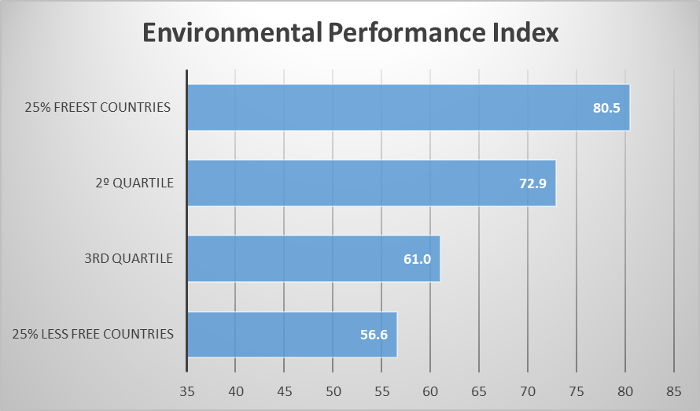
Source: Heritage Foundation. Yale.edu. There are no countries with a score lower than 35 points in the Environmental Quality Index.
The scatter plot shows how the relationship between economic freedom and environmental performance is positive. Each point in the diagram represents a different country.
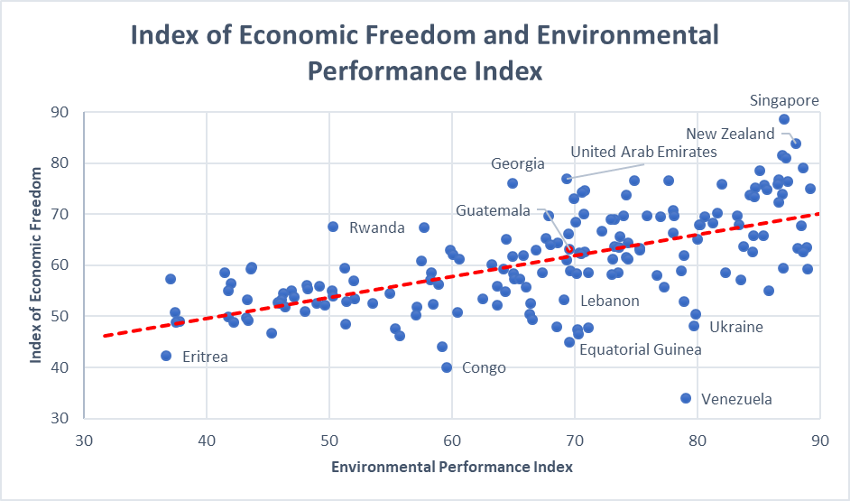
Source: Heritage Foundation. Yale.edu
The regression analysis shows that for every one point increase in the Index of Economic Freedom, there is a 0.96 point increase in the Environmental Performance Index. The positive correlation could not be clearer.
However, the relationship between these variables is not static. In the end, environmental quality could deteriorate as a result of laissez faire policies in the long-term. To whether this is true, we examined the Environmental Performance Index with the average of the Index of Economic Freedom for the last 15 years. Once again, each point in the diagram represents a different country.
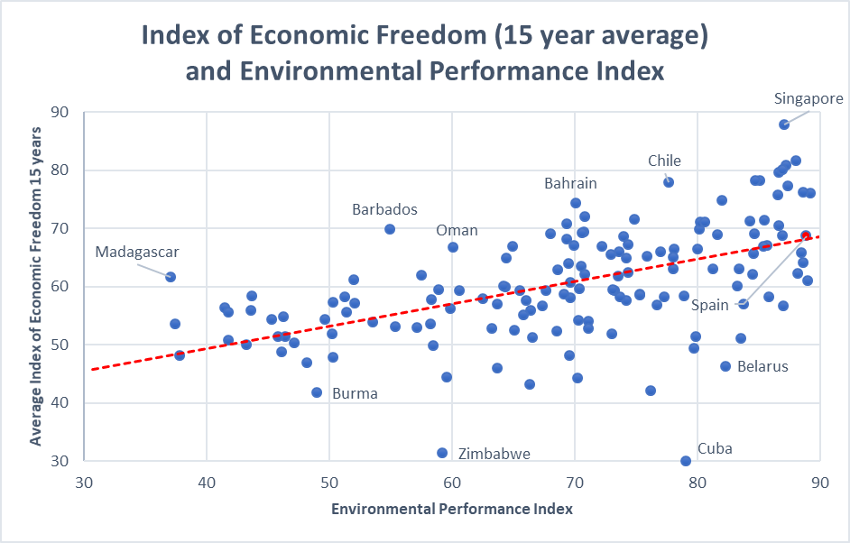
Source: Heritage Foundation. Yale.edu
Once again, we can observe how countries with greater economic freedom, throughout time, have a better environmental performance.
Exporting Pollution
One possible criticism of the argument presented here could be the following: the countries with greater economic freedom—and the most prosperous ones—are “exporting” their polluting industries to the less free third world, while keeping non-polluting industries in their country. Large companies based in the first world would take advantage of the failed governments of the developing world, polluting there what they are not able to back home.
To see whether this is true, we would expect that the countries with a large influx of foreign direct investment to have a bad score on the Environmental Performance Index. However, this is not the case.
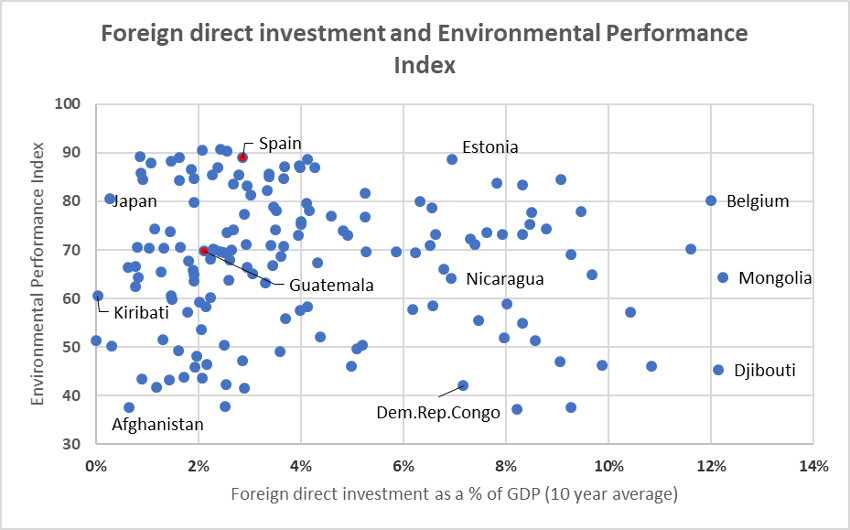
Source: World Bank. Yale.edu
The criticism seems to lack evidence. The relationship between both variables is non-existent, the level of foreign direct investment fails to determine the level of environmental performance. We cannot confirm that free—and rich—countries export their pollution by relocating companies to less free countries. However, we can confirm that greater foreign direct investment “exports” good environmental practices to developing countries.
If we analyze foreign direct investment from countries with a very high environmental performance—above 85 points in the index—and countries with a very poor environmental performance—below 50 points in the index—we see that the former hardly invests in the latter. Less than 0.1% of foreign direct investment from “cleaner” countries goes to “dirtier” countries. Of the 25 “clean” countries, 14 do not have a single investment in “dirtier” countries. Out of the remaining 11, only one exceeds 5% of its investments towards “dirty” countries. Only two countries allocate more than 1% of their foreign direct investment to the “dirtiest” countries.
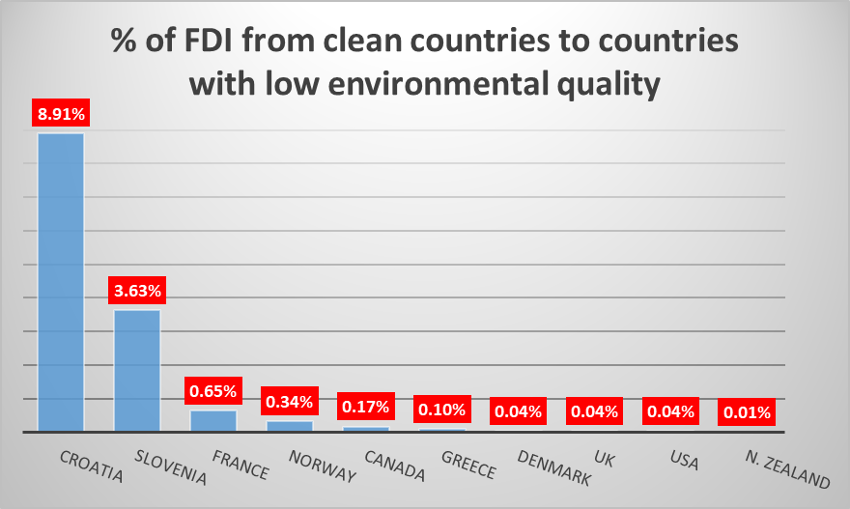
Source: OECD. ONU (Unctad.org)
In short, countries that destroy the environment do so alone or with the investment of countries that also destroy their environment. Most of the investment of “clean countries” goes towards other “clean” countries. Pollution is not “exported” from rich countries to poor ones.
What About Investment in Mining & Extraction?
It is often said that extraction industries tend to pollute and degrade the environment more than other sectors. Furthermore, these sectors tend to have bad press. Therefore, it could be that total foreign direct investment has no relation to environmental quality, but it could also be that foreign direct investment has a stake in extraction industries, having a negative impact on the environment.
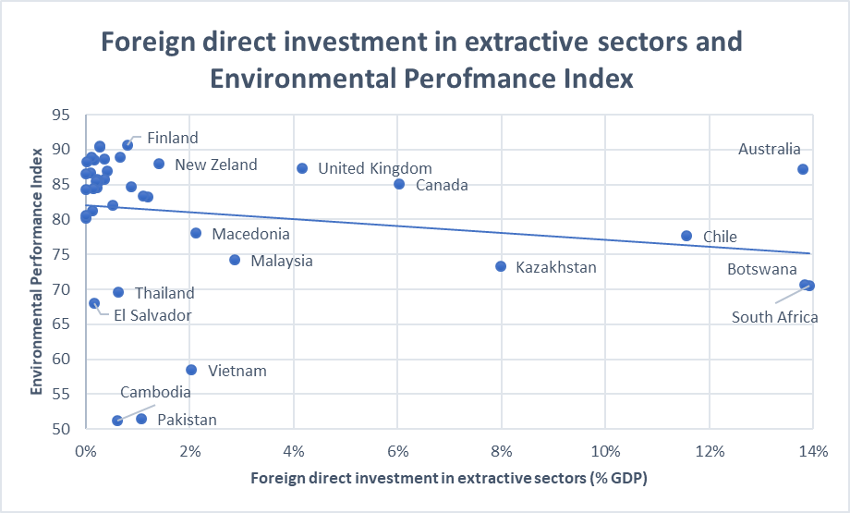 Source: World Bank. Investmentmap.org.
Source: World Bank. Investmentmap.org.
This time we see a line with a slight negative trend. However, if we perform a regression analysis (which is what this trend line is based on) the relationship between the variables is not statistically significant — in other words, there is no relationship between the variables.
Even if there is greater economic freedom in the recipient country, a large investment in extraction industries does not degrade the environment.
Correlation Is Not Causality
The best criticism to this article could read as follows: “very well, but the data exposed here does not prove anything, it only shows correlations and does not show causality.”
Indeed, causality is explained by a theory or a set of logical relationships that aim to unite different events and give shape to a complex world that is perceived as chaotic. In other words, data does not speak for itself, it is interpreted through theories.
There are theories explaining how the freest countries, besides being the most prosperous, tend to take better care of the environment. In the same way, there are theories that expose the contrary relationship: the greater the economic freedom, the more degraded the environment. Both theories are based on opposing world views, what makes it interesting is comparing these theories with the available data. With the data at hand, it seems that the theory closest to reality is the one that claims that better economic freedom generates better environmental results. This relationship is not irrefutable; good environmental quality depends on many other variables. However, it is clear that as capitalism advances, so does the environment.
Conclusion
With the data analyzed, we can see that capitalism suits the environment. The greater the economic freedom, the better the environmental quality indexes.
The “cleaner” countries do not export their pollution by relocating companies. In fact, “cleaner” countries do not even invest in the “dirtiest” countries.
Annex 1
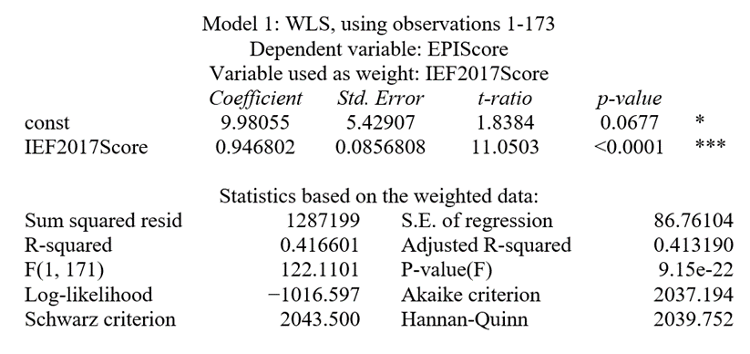
Annex 2
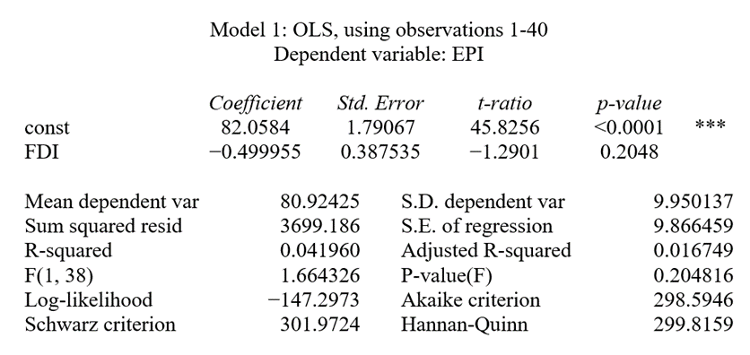
Get our free exclusive report on our unique methodology to predict recessions

Daniel Fernández
Daniel Fernández is the founder of UFM Market Trends and professor of economics at the Francisco Marroquín University. He holds a PhD in Applied Economics at the Rey Juan Carlos University in Madrid and was also a fellow at the Mises Institute. He holds a master in Austrian Economics the Rey Juan Carlos University and a master in Applied Economics from the University of Alcalá in Madrid.
Get our free exclusive report on our unique methodology to predict recessions



Leftism is a mental disease. Socialism sucks!
Bye
De acuerdo con que el capitalismo no puede ser un factor que afecte el medio ambiente, el primer punto y creo que uno de los más importantes en esta sección es que los recursos naturales de las personas son limitados para poder generar su producción y eso lleva a los empresarios a ser personas inteligentes y con la libertad que tienen en la economía cuidar el ambiente para poder tener mejores y más recursos para su producción, la competitividad y el interés propio que son uno de los pilares del capitalismo llevan a las personas a desarrollar un mejor ambiente para aprovechar de la mejor manera y ser más aceptados por los consumidores ganando la competencia económica especialmente en estos días donde la personas apoyan lo orgánico y el cuidado al medio ambiente.